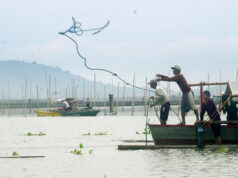Cacao farmers organize to directly sell to Puentespina, Kennemer

CACAO SMALLHOLDERS in Davao Oriental have organized to directly sell their produce to Kennemer Foods International, Inc. and Puentespina Farms, maker of the Malagos Chocolate brand.
The cacao farmers hope to deliver 227 metric tons of dried fermented cacao beans in the first year of their new direct-sale arrangement and increase this by 85% by the third year, according to Provincial Agriculture Office head Rotchie M. Ravelo.
“While, in process, also increasing the farmers’ income by 37.17%,” Mr. Ravelo said in a statement from the provincial government.
The 924 farmers are beneficiaries of a P14.5 million program under the Philippine Rural Development Project’s (PRDP) Investment for Rural Enterprise for Agricultural Productivity.
The World Bank-funded PRDP is implemented by the Department of Agriculture (DA), with required counterpart funding from the local government and beneficiaries.
Under the program, the farmers are getting post-harvest facilities along with production and marketing support.
The first batch of facilities and equipment turned over to one of the seven cacao cooperatives on July 1 include a solar tunnel drier, fermentation facility, storage, cargo truck, weighing scale, and a moisture meter.
“The project aims to produce fermented dried beans that command a higher price than the traditional and sometimes poor-quality dried beans produced by farmers… the fermentation facility will lessen the impurities of the beans and bring out its most desirable flavor, a quality which chocolate manufacturers are looking for in cacao beans,” Mr. Ravelo said.
DA-Davao Regional Director Ricardo M. Oñate said despite the ongoing coronavirus crisis, “there is a clear and sure market for the cacao beans.”
“While the province now has a local market, the DA hopes to secure export markets for the cacao industry. This is the reason why we are enhancing the production and our marketing strategies,” he said.
Davao Oriental Governor Nelson L. Dayanghirang said boosting the province’s cacao industry is also a means of providing alternative livelihood to coconut farmers.
“We don’t want our farmers to rely solely on coconut. Currently, we are embattled due to the low price of copra. We must be resourceful in augmenting our income, try other possible means, like intercropping cacao,” he said. — Marifi S. Jara



